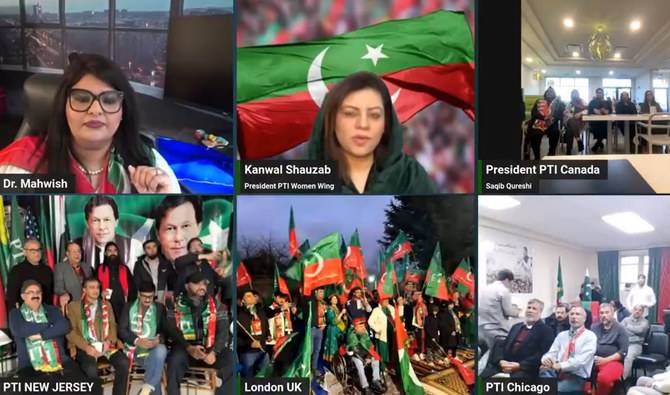If not a complete shutdown, reports from various monitors and observers have shown that the internet was disrupted in Pakistan on Sunday when the Pakistan Tehreek-e-Insaf (PTI) staged a virtual rally. But the bigger question is whether drawing a large crowd online reflects having significant popularity offline and on the ground.
This was discussed in the latest episode of 'Khabar Say Aagay' on Monday.
In the episode, Asad Baig of Media Matters For Democracy (MMFD), an organisation working in the media development space and which has monitored the evolution of orchestrated trends online in the past, spoke about the internet disruption and how many people had tuned in to participate in the virtual rally and what does that mean for the party.
He said that reports of various internet monitors had confirmed that the internet did face throttling in Pakistan on Sunday when PTI held the rally.
Baig said that the Constitution grants a fundamental right to assembly, whether on the ground or virtually, and if any step is taken to disrupt that, it becomes problematic.
He further said that employing blocks or throttling to counter a potential virtual assembly adds to the country's larger perception of internet uncertainty, which can impact your ability to attract investment in information technology.
By taking a whole of internet approach towards disruption and blocks, Baig said that it only causes more harm to us than good.
On how many people had participated in the virtual rally, Baig said that there were some key trends to note.
"It does not matter how many people were online, who was watching or not because you cannot translate that into support," he said, adding that there would definitely be a lot of accounts who tuned in on Sunday who also participated in online harassment campaigns against journalists Gharida Farooqui and Asma Sherazi but was explained as 'public sentiment' when all of this was later found to be orchestrated.
"There were bot accounts and your alleged supporters who were targeting Asma Sherazi, and we saw it was an orchestrated activity. When the campaign was launched against former army chief Gen Bajwa, I had tweeted out how there was a large percentage of accounts who were tweeting against Gen Bajwa and who were also tweeting under the trend #ImportedGovtNaManzoor," he explained.
Baig said that the party used to own the accounts when they tweeted under #ImportedGovtNaManzoor but disowned them when they were tweeting against Gen Bajwa.
"Political parties should gain popularity, but when you were running orchestrated campaigns against journalists and was attributed as a public reaction, one of these has to be wrong," he said.
He later said that lawmakers get thousands of votes when they contest elections, but this does not translate into the digital space. "Just to say so many people were watching translates into popularity, I do not agree with this."
However, he clarified that social media does have an impact on political discourse and electoral activity.
Marwat's bail
Earlier, Sher Afzal Marwat's lawyer, Khurram Khosa, appeared in the show and provided details of how Marwat was arrested and the legal complications.
Khosa said that the court approved Marwat's bail and directed the district administration to ensure Marwat's release by the same order whereby he had been detained under the Maintenance of Public Order (MPO).
He added that when Marwat was arrested from outside the Lahore High Court last week, they went to the relevant police station in Mazang. However, officers there did not have any information about the arrest despite clear rules to inform the relevant police station of an arrest.
When they went to the CCPO's office, an officer spoke to them rudely. Subsequently, they challenged Marwat's detention via a writ petition in the court.
When the court inquired about why Marwat was detained, the government presented orders to detain him under MPO. The court, however, objected to the language used in the MPO, where a potential threat was cited that Marwat could incite a crowd while speaking in the Bar room. The court further said that crime is something which is backed by some action and evidence, it subsequently asked for a report on the matter.
On Monday, when the case was taken up again, the government only presented the MPO and reasons cited by the deputy commissioner. The court directed the government to present any evidence of any other information or case outstanding against Marwat. However, the government only presented the MPO. The court subsequently ordered his release.
Khosa said that if the court's orders are defied, they would file contempt proceedings against the officials responsible.
On reports that the computerised identity cards (CNICs) of individuals affiliated with the PTI and wanted in May 9 incidents were being blocked, Khosa explained that CNICs can be blocked legally if someone is declared an absconder by the court. However, he added that this is easily challenged in court if the absconder says they were in hiding because of fear of political victimisation or of being killed.
Muneer Bajwa said that this is the first time the police have asked the court to declare wanted people as absconders and have their identity cards blocked because they were refusing to participate in investigations and are in hiding.


